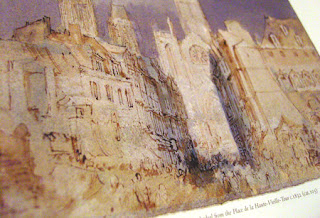For
those of you who are in doubt if they should join the trip to the
Turner exhibition in Aix: GO! It will inspire you... Here's a 2012
Aquarellista blogpost about his life... The trip is on 16 September, by
comfortable bus and the cost is only 45€ for Hangar members!
Contact Marijke Obbink marijke.obbink@free.fr to subscribe
William
Turner (Joseph Mallord William Turner, 1775 - 1851) was an English
watercolourist, a predecessor Aquarellista! In the next post I'll write a
bit about his style, in this one more about his life.
Turner
was born into a middle-class family in London. His father was a
wig-maker and barber. His mother died while he was quite young. William
Turner was sent to live in the countryside with relatives who soon
discovered that he was very talented: he painted this castle when he was
10 years old:
Unbelievable... he could definitely observe...
He
joined the Royal Academy of Art at the age of 14 - and, surprise
surprise, he excelled. He left London in 1798 "with little more than a
borrowed pony and pencils" and started painting a series of landscapes
around Wales...
This work he made as a 23-year-old in his Hereford Court sketchbook. It fetched up £500,000 at a Christie’s auction...
Turner had success and made a fortune when he was quite young. That gave himl the opportunity to innovate freely.
Young William Turner - selfportrait as a bit of a dandy
Turner
travelled widely in Europe, starting with France and Switzerland in
1802 and studying in the Louvre in Paris in the same year.
He also made many visits to Venice
As
he grew older, Turner became more eccentric. His paintings changed in
style and his audience struggled to understand his vision. He had few
close friends except for his father, who lived with him for thirty
years, eventually working as his studio assistant.
Old William Turner - in his atelier
And
the atelier once more - look again - and you'll see how impressive it
is... especially if you realize that this was painted in the 19th
century!
William
Turner died on 19 December 1851 and lies buried in St Paul's Cathedral.
He left his money to support what he called "decayed artists". He
designed an almshouse for them at Twickenham, with a gallery for some of
his works. But some relatives contested the will and part of his
fortune was awarded to the family. The rest went to the Royal Academy of
Arts who still from time to time award students the Turner Medal...
NB: I have used pictures from the Turner special in the Figaro - to have a look inside, borrow it from me or order via
http://www.lefigaro.fr/















